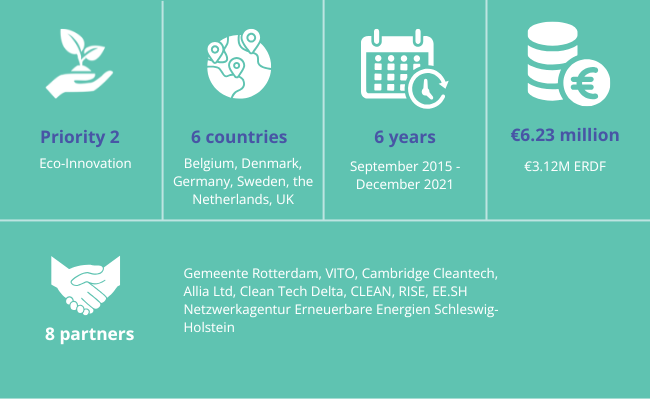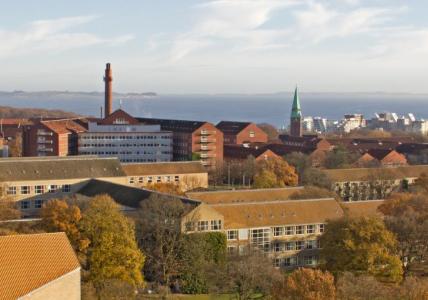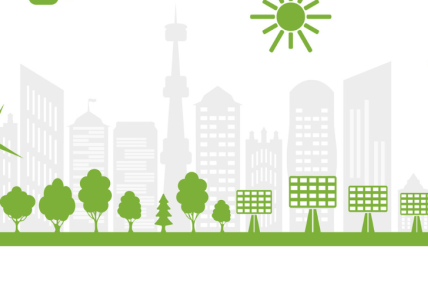By connecting SMEs with transformative ideas to large buyers with the funds to implement them, the SCALE-UP project produced a quarter of a million tonnes of annual CO2 savings through smart matchmaking.
As COP27 recently showed, there is a pressing need to transform the way we live to avert climate catastrophe. To respond at the scale required, we need rapid implementation of sustainable innovations that can create impact across many sectors and be scaled up in a short period of time.
SMEs and startups are often the source of the society-changing innovations we need. But they typically lack the financing and capacity to expand their ideas to have a meaningfully-sized impact on the market. This role is more effectively played by buyers of technology, which have the resources and network necessary to make green ideas scale at lightning pace.
To stand a chance of building a greener future in limited time, we need to match the strengths of SMEs and big buyers to get innovative green products to market faster than ever.
This is what the SCALE-UP project helped facilitate. By organising transnational matchmaking events, training SMEs and buyers, and offering business support to newly created collaborations, SCALE-UP accelerated the uptake of innovative green products and services by large technology buyers, activating more than €13 million in investment.
Meet the buyer
From 2016 to 2021, SCALE-UP hosted unique ‘Meet-the-Buyer’ events. The meetings brought large organisations (private or public) with specific sustainability needs together with SMEs and start-ups with potential green solutions. Innovators had a limited time (often 10 minutes) to present their products/services.
Meet-the-Buyer events democratise access to ideas and buyers. They offer buyers a concentrated pool of innovators from across the North Sea Region, while innovators get a zero-cost platform to meet buyers who can scale their product towards significant climate mitigation.
One striking example is Woonstad, a housing association in Rotterdam looking to make their dwellings more energy-efficient. Through SCALE-UP, Woonstad contracted SME innovator OverMorgen to provide an application that connected 624 dwellings to a district heating network. The result was a 77% reduction in CO2 emissions per year, an annual saving of over 900 tonnes.

SCALE-UP Meet-the-Buyer in the United Kingdom.
SCALE-UP matchmaking enabled 248,000 tonnes of annual CO2 savings
The SCALE-UP formula proved very successful. SCALE-UP brought together a total of 92 buyers and 969 SMEs. It involved stakeholders from the seven North Sea Region countries and caught the attention of organisations from a further 18 countries.
But the work done in SCALE-UP was not limited to events. To maximise the chances of a successful partnership between innovator and buyer, pre-event preparation and post-event follow-up were carefully managed.
Before the actual event took place, SMEs and start-ups had the chance to receive training on the skills to present their solutions within a strict time limit. After the event, potential buyers chose the most promising solutions, and SCALE-UP partners assisted them in defining next steps and keep conversations going.

Training session for SMEs in Gothenburg, Sweden.
The result of this work is that hundreds of new collaborations were established, most of them transnational. At least 42 green products or services had been adopted by project end, reducing emissions from existing technology by more than 50% on average. In absolute numbers, SCALE-UP contributed to annual savings of 248,000 tonnes of CO2.

Pyrolysis oil plant at the Port of Rotterdam (The Netherlands), a SCALE-UP success case.
Though total investment raised has not been calculated due to confidentiality, €13.6 million of unlocked financing has been announced publicly. Despite the limited data, we can conclude that this is a 5x multiplication of the original ERDF funding for the SCALE-UP project.
The matchmaking continues
Since the end of the project in December 2021, SCALE-UP partners are still implementing the project methodology and working together where possible to host new transnational ‘Meet-the-Buyer’ events. Furthermore, this methodology has also been adopted by cleantech clusters outside of SCALE-UP, such as the International Cleantech Network (ICN).
If you are interested in replicating the SCALE-UP methodology to bring together the best of SME innovation and buyer capacity, contact project manager Valentí Prat for guidance and support.
Top 3 project highlights
Climate change mitigation
SCALE-UP reduced emissions in 42 locations by more than 50% on average. This represents more than 248,000 tonnes of CO2/year. This number could increase even further if more leads are confirmed in the future.
Engagement with companies
Over 1000 organisations (969 SMEs, 92 large buyers and public administration) participated in transnational SCALE-UP activities, proving the effectiveness of our methodology and the willingness of stakeholders in the North Sea Region to work together.
Additional investment
At least €13.6 million of private and public funds were unlocked for sustainable innovations. All investments concerned solutions procured by large buyers in the North Sea Region and/or delivered by SME based in the region (in most cases both).
The SCALE-UP partnership
A total of 8 partners from 6 North Sea Region countries took part in SCALE-UP:
- The Netherlands: City of Rotterdam, Clean Tech Delta (CTD).
- Belgium: Cleantech Flanders/VITO.
- United Kingdom: Cambridge Cleantech (CCT), Allia.
- Sweden: Research Institutes of Sweden (RISE).
- Denmark: CLEAN Cluster.
- Germany: Erneuerbare Energien Schleswig-Holstein (EE.SH).
Want to know more? Visit the SCALE-UP website here.

SCALE-UP at a glance

About the authors

Rolf Bastiaanssen
Rolf has been a partner and senior consultant at Bax & Company, a European innovation consultancy firm involved in the SCALE-UP project. Involved in several leading R&D projects and in business planning for start-ups and established industry players, Rolf’s fields of experience include local energy communities, photovoltaics and construction.

Valentí Prat
Valentí is an innovation consultant at Bax & Company specialised in project management, development and administration. He is currently coordinating several collaborative initiatives across Europe, fostering innovation in fields such as sustainability, industry 4.0, govtech and public health.

Christian Riester
Christian is an innovation consultant specialised in energy efficiency, renewable energy and future mobility. He is co-founder and CTO of Pendel Mobility, a startup focused on integrating automated, carbon-free vehicles into public transport. At Bax & Company, Christian also works in the areas of green & smart mobility and digitalization of transport.



